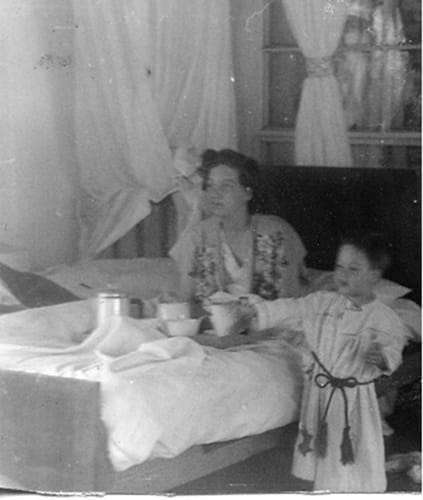Early Morning Tea

Early Morning Tea
Tea was more than just a drink. It was a ritual, appropriate for almost any official function as we saw in the last piece from my novel, The Hospital Christmas Tea. There were teas to celebrate a dignitary’s arrival, the opening of a new facility or a business, served at the annual fete and after the weekly church service, whatever the denomination. There was tea at tennis, tea after bowls, numerous teas to fortify one through the tedium of a cricket match. Less elaborate, it punctuated our every day lives, too, from dawn to dusk beginning with early morning tea in bed.
Here is a memoir of how it played out at our house.
Early Morning Tea
The verandah embraced our house safely in its wrap-around arms. It was fully enclosed with taut wire screening to protect us against the ubiquitous plagues of Africa: house flies by day and mosquitoes by night. We moved our beds out there in the summer (which lasted almost all year long) to catch any hint of a breeze. The mornings were best.
Early morning tea was served on a tray and started the day sharply at six as we gathered around Mom’s bed.
The pot seemed endless as we drank in the verses she read to us from Now We Are Six by A.A. Milne, while Dad did his calisthenics in his underpants. He started with 100 step-ups, using a foot rest from one of the verandah chairs. He went on to squats, sit-ups, push-ups, jump and reach. Next were dorsal raises and finally hip adductions using the foot rest again. As he sat down at the verandah tablea bit puffed, he propped up his elbows and began his ten-minute series of muscle control exercises. “You should all join me,” he said. “This is what they teach you in the army. Fitness! Self control! Confidence! That’s what fitness gives you, total confidence to know you have tireless energy to tackle the day, however long.”
“Here’s your tea,” my mother would offer again. “It’s getting cold.” He’d disappear for a quick cold shower, return dressed, ready for Sick Parade at seven, and gulp it down.
“You know the least you can do is keep yourselves fit. Start the day with enthusiasm,” he’d chide us. “Embrace the sunshine. These poor blighters on the mine sweat it out, day after day underground. They plummet down in the cage where day is night with not so much as a single star. You are so lucky! Most of the mine boys are pretty much deaf after a few years from the noise of the pneumatic drills. Silica chokes their lungs. Damp rots their skin. They make just enough pay to send home to their families in Nyasaland. There are no jobs up there. Maybe there is enough money left over to go to the beer hall on Saturday night. I’ve got to go,” he’d end abruptly, “And weed out the malingers. Up everyone! Up! Rise and shine. We’re getting through Sick Parade in less than an hour. You see, we’ve eradicated the misery of scurvy. What did it take? We introduced oranges into their rations instead of vegetables that they had to cook. Application! That’s what it takes. Apply yourselves to the task at hand whatever it is. The screen door banged behind him as the hooter wailed the change in shift and Sick Parade began.
